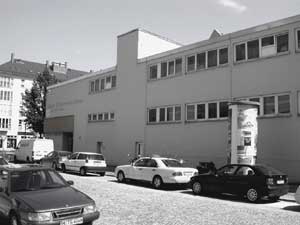The Bavarian capital of Munich is one of Germany’s boom towns: rapid population growth in the past few years has driven up rents and strained public services.1 Now, another consequence of the city’s expansion has become clear: a lack of mosques and Islamic prayer spaces.
Growing Muslim population – and mosque closures
By 2014, 100,000 of Munich’s 1.5 million inhabitants were Muslim.2 This figure has only been on the rise since then, due to the arrival of large numbers of Syrian and Iraqi refugees in the city.
In spite of the increased demand for Islamic religious spaces and services, mosques within Munich’s city limits have, in fact, been closing down in recent years. At the end of March, 2017, the Kuba mosque, the last of what used to be nine mosques in the area surrounding the central train station – home to many Muslim shopkeepers and employees – shut its doors.3
The stories of mosque closures tend to mirror each other: local Muslim associations have their rental lease agreements cancelled since their premises are overcrowded and hence violate fire safety regulations. In the case of the Kuba mosque, at Friday prayers up to 450 believers had crammed into a room designed to hold a maximum of 90.4
Plans for a larger mosque
In the case of Munich, plans to build a larger mosque have been mooted for years without ever coming to fruition. The Munich Forum for Islam (MFI), an association bringing together Muslim representatives as well as local politicians from various political parties, had proposed the construction of a representative mosque north of the city centre.5
The project was set to include not only an Islamic house of prayer, but also training facilities for Imams, a library, a cultural space, and a café grouped around a public plaza. However, the project failed to gather the necessary funds to acquire the plot of land on which it was to be built.6
Reasons for the failure
The reasons for this failure were manifold. The notoriously divided and financially weak Muslim associational scene did not always speak with one voice and did not manage to function as a convincing lobby for the project.7
What is more, the MFI always put great stress on the need to emancipate itself from any ties to the countries of origin of Muslim immigrants. Such ties have emerged as a core obstacle to the political and societal recognition of existing Muslim institutions in Germany. At the same time, however, the MFI’s attempts to gather donations focused mostly on attracting Arab funds from the Gulf. For many outside observers, this approach was not conducive to building confidence and trust.
Some commentators have pointed out, however, that another reason for the project’s miscarriage was a lack of political will on the part of the local administration: when it came to the crunch – notably the acquisition of the plot for the construction site – the political support on the part of the city’s decision-makers was lacklustre at best.8
Enduring political dilemma for mosque communities
The fate of the MFI mosque highlights the enduring dilemma faced by comparable efforts elsewhere in Germany: a lack of financial and political capital confines Muslim prayer to the outskirts of town – Munich’s largest mosque is located on the city’s northern edge next to a sewage treatment plant – or to small and often insalubrious prayer spaces in apartments, ancient warehouses, or disused factories – so-called ‘backyard mosques’ (Hinterhofmoscheen).
Whilst politically ostracised as tools of authoritarian Middle Eastern governments, only those mosque communities backed by wealthy donors or state agencies from Turkey and the Gulf are, as of now, capable of building appropriate houses of worship. Any community wishing to emancipate itself from these backers – such as Munich’s MFI – is thus caught in a real bind.
Backlash against public prayer
To draw attention to this state of affairs, a number of Munich’s Muslims got together on social media and sought to organise a public Friday prayer at Marienplatz square, the city’s historical heart in front of the town hall.
Yet the right-wing backlash online against the planned public prayer was so fierce that the organisers decided to cancel the event. They feared both that they would not be able to guarantee the safety of potential attendees, and that such a highly public demonstration would make their attempt to raise awareness of the lack of prayer space seem too confrontational and thus counter-productive.9
This week, the local Jesuit community of Saint Michael offered a pray er room to all those who had wished to attend the event at Marienplatz. Whilst this amounts to a precious gesture of interreligious dialogue, the picture of Munich’s Muslims having to pray under an almost life-sized crucifix struck many belivers and observers as at the very least odd.10
Sources
http://www.sueddeutsche.de/muenchen/einwohnerprognosen-warum-das-bevoelkerungswachstum-in-muenchen-probleme-macht-1.2984306 ↩
http://www.sueddeutsche.de/muenchen/moschee-projekt-in-muenchen-schmid-will-idriz-unterstuetzen-1.2061937 ↩
http://www.sueddeutsche.de/muenchen/moscheen-muslime-haben-in-muenchen-kaum-platz-zum-beten-1.3445341 ↩
http://www.sueddeutsche.de/muenchen/moscheen-muslime-haben-in-muenchen-kaum-platz-zum-beten-1.3445341 ↩
http://www.sueddeutsche.de/muenchen/moschee-fuer-muenchen-muenchen-bekommt-kein-islamzentrum-zumindest-erst-einmal-1.3055209 ↩
http://www.sueddeutsche.de/muenchen/gescheitertes-projekt-mit-dem-aus-fuer-die-muenchner-moschee-scheitert-mehr-als-eine-idee-1.3055211 ↩
http://www.sueddeutsche.de/muenchen/gescheitertes-projekt-mit-dem-aus-fuer-die-muenchner-moschee-scheitert-mehr-als-eine-idee-1.3055211 ↩
http://www.br.de/nachrichten/moscheen-muenchen-demo-100.html ↩
http://www.sueddeutsche.de/muenchen/raumnot-moscheenot-in-muenchen-muslime-beten-in-der-michaelskirche-1.3513855 ↩






